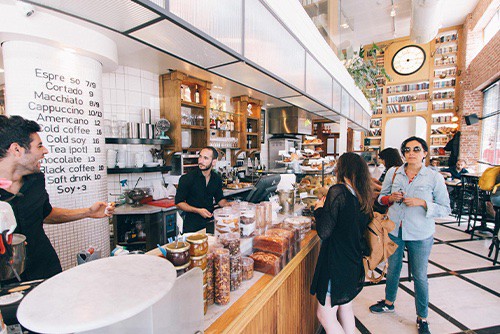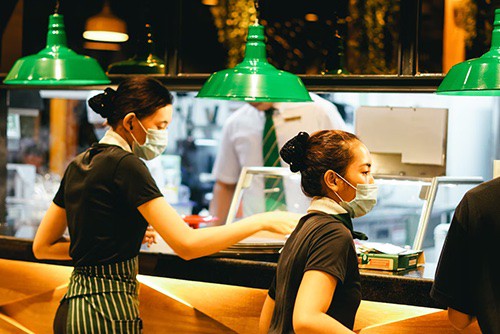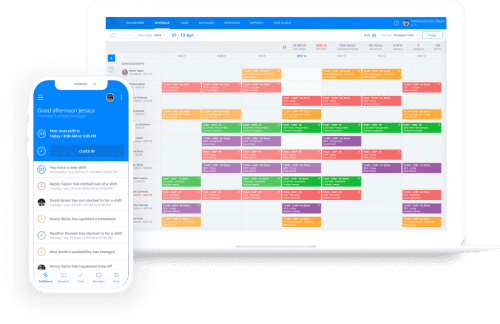Staffing and Scheduling: Differences Managers Need to Know
Knowing the difference between staffing and scheduling helps managers make good ...

Your restaurant is decorated to the nines. Your bar is stocked with only the best. And your menu is a study in perfection. But even the best decor, liquor, and food in the world is nothing without the staff to serve it and show it off. Unfortunately, restaurant staffing is an oft-overlooked aspect of running a successful restaurant.
Getting the right person for the right job can help your restaurant stand out from the crowd by giving you a reputation for quality service. And that doesn’t just apply to the servers. Quality service includes everyone from the head chef all the way down to the dishwashers and everyone in-between.
Without each person doing their job — and doing it well — your restaurant can flounder. So to help you maximize your restaurant’s success, we’ve compiled the best tips for getting the most out of your restaurant staffing.
Yes, experience is very important. But an inexperienced-yet-passionate server who is willing to learn and grow can often make for a better hire than someone who’s just been around for a long time.
Remember, experience can be accumulated just by showing up. It says nothing about attitude. Passion, however, can’t be taught but can make a huge difference in the attitude of the employee.
The ideal employee will have both passion and experience. But we suggest you don’t dismiss a passionate applicant just because they don’t have years of experience.
Your behavior sets the model for everyone else’s behavior. If you want your front-of-house staff to treat the customers cordially and with respect, you need to treat the servers and hosts with that same cordiality and respect. And that doesn’t just apply to the server/customer relationship.
How you treat your staff will be reflected in how they treat each other. So if your chefs are snapping at the servers or vice versa, it might not be them, it might be you.
That’s why we recommend leading by example in everything you do. Behave the way you want your staff to behave and they’ll follow suit.

How you present your place of business to potential employees has a lot to do with restaurant staffing success. Find your brand and then sell your restaurant as an exceptional place to work. We recommend communicating to potential employees how you can help further their skills.
Whether it’s on-the-job training, continuing education, or the opportunities to learn something new, this can be a great way to motivate good employees to work in your restaurant.
When you see an employee doing something right, don’t be afraid to acknowledge it and reward their efforts. This positive reinforcement will encourage all your employees to go above and beyond just getting it done.
And rewarding your restaurant staff doesn’t have to be an expensive proposition. You could give movie tickets or gift cards as a reward. You could also go old-school and just commend them one-on-one or single them out during a staff meeting.
This type of recognition goes a long way to making your employees happy.
This may sound like a daunting proposition, but it doesn’t have to be. Job posting boards, like Monster and Culinary Agents, allow you to post jobs and search for candidates across multiple cities.
And lest you think that no one would want to change cities just to work in your restaurant, don’t discount the fact that there may be someone out there who’s ready for a change of scenery.
Present your restaurant as a unique and fun place to work, offer them what they need to excel, and you can pull great employees from other cities.
Staff meetings don’t have to be boring. Simple things, like opening with a funny story or taking a few minutes to play a team-building game, can go a long way to setting a positive, fun tone for your meeting.
You’ll be more engaged, and your employees will be more engaged. That’s a win-win for everyone.
Sure, we all want the cache that comes from hiring someone who attended the Institute of Culinary Education. But names and titles don’t have to be the be-all and end-all of your restaurant staffing decisions.
Smaller, less well-known programs can turn out some truly passionate people. We recommend keeping an open mind when it comes to recruiting for your restaurant.

Customer complaints are going to happen. It’s inevitable. But when you give your servers and staff the freedom to solve these problems, everyone wins.
The customer is happy, and your server is happy. And the nice thing is, it often comes down to nothing more than offering a free dessert or drink from the bar.
But knowing that they have the freedom to do what is necessary to improve the dining experience can give your employees the permission they need to handle problems before they get out of hand.
While money is an important factor in restaurant staffing, it’s not the only thing to consider.
Employees want opportunities to learn and a sense of fulfillment from their job, not just another $0.25 an hour.
Are you giving your staff the opportunity to try new things? Are you showing them that you care? These things can often make up for a lower hourly wage and bring in some truly good employees.
Problems between staff are going to happen. It’s another one of those inevitables in the restaurant business. The trick is to address those problems sooner rather than later.
If you let a problem between two staff members slide, it could fester and spread to other employees. Then you’ve got an even bigger problem on your hands. Put out the fire while it’s small so it doesn’t engulf the whole restaurant.
Yes, running a restaurant is a serious business. But it doesn’t have to be all stuffed shirts and starched collars (unless that’s your brand). You can have fun. And your staff should be allowed to have fun as well.
Of course, you don’t want employees hurling food around the dining room on a busy Friday night. But you, and they, shouldn’t be afraid to joke with each other and especially with customers.
Diners are there to have a good time and a bit of levity can only make things better.
Think of your staff as the voice of your customers. Your employees interact with the customers a lot more than you do.
They hear things and see things and, in the process, figure out better ways to do things. It could be something as simple as how you set the table or something as complex as the color of the paint on the ceilings.
Whatever it is, encourage your staff to voice their opinion on the matter. Who knows, it may be a great idea. And remember, if your staff sees something that needs to be changed or has a great idea to make your restaurant better, chances are, your customers have seen it or had it as well.

Every employee is an important part of the successful operation of your restaurant. What would happen if your dishwasher didn’t show up one day?
It wouldn’t matter how great your chef is or how efficient your servers are. If you don’t have any clean plates and silverware, you may as well close.
Sure, you probably have someone who could step in as a dishwasher, but this illustration shows you how integrated each and every job in a restaurant actually is.
One job may require more skill or experience than another job but that doesn’t make the less-skilled job any less important. Be respectful to every employee and show them that you value their work. And demand that your employees do the same.
At its heart, a team is like a family. And families know what’s going on in each member’s life.
So don’t be afraid to get to know your employees. Ask them about their interests. Ask them about their hobbies. Find out what’s important to them.
This will help your employees feel like more than just a server or more than just a dishwasher. It will make them feel like a member of your family.
Encouraging healthy competition is another way to bring a little fun to the restaurant business.
Perhaps pull your servers aside and challenge them to see who can come up with the highest check average in a certain period of time. Or challenge your dishwasher to see how fast he can go from dirty to clean or how many loads he can do in 30 minutes.
Your employees have fun with a new challenge and your restaurant can benefit as well.

Whether your restaurant has two staff members or 200, every employee needs to have a clear understanding of team oversight in order to do their job effectively.
In essence, they need to know who’s responsible for what — and not just the individual tasks that must be completed, but also for making decisions and coordinating the rest of the team.
With a clear oversight hierarchy in place, employees will know to whom they should go to get approval for something or to obtain their next task.
They can go straight to the appropriate manager or team member and won’t have to disturb others looking for answers.
Try creating a hierarchy of team oversight and publishing it in your employee handbook. That way, if an employee needs to get approval for something, they know where to look to find out who’s responsible.
Once you establish the hierarchy, do your best to keep it as static as possible.
If oversight is constantly changing, it’s very easy for staff members to get confused about whom they should approach with certain issues.
For tips on creating an effective hierarchy of team oversight, take a few minutes to read this article from the Sling blog: What Is An Organizational Chart And Why Does Your Business Need One?
Learning to deliver constructive feedback is a powerful way to build a strong team and improve your restaurant staffing.
Constructive feedback is the process of delivering work-related comments, advice, and suggestions in a way that motivates your employees to perform their job better.
If what you say — and how you say it — doesn’t build the person up, it may not be constructive feedback at all. It may be criticism.
The distinction can be hard to see, but here are five distinct differences between the two to help you understand:
The purpose behind your feedback can be anything you want — working on weaknesses, improving behavior, shoring up gaps in job performance — as long as you do your best to be constructive rather than destructive.

Giving constructive feedback to your employees is essential for building a strong team, and that feedback should go both ways.
You want your staff to feel comfortable talking to you about problems they’re facing, and even, perhaps, about how you can improve as a manager.
But it’s not enough just to ask for feedback — you have to listen to what your employees are saying and do your best to act on it.
When your staff sees that you take their feedback seriously, they’ll be more likely to feel like they’re part of a real team rather than a group of individuals who show up, do a job, and go home.
If asking for feedback from your team is new for your business, try setting up a digital or paper-based “suggestion box” to get things started.
Encourage your team members to give feedback on such subjects as:
When your staff gets comfortable communicating with you in that way, up the ante, so to speak, and try establishing “open-door hours.”
A set open-door policy gives your employees the freedom to talk to you directly about what they’re experiencing on the job.
Don’t leave job performance up to chance. Set expectations for every aspect of the work experience so that everyone on your team knows what they need to do and to what standards they need to do it.
These performance expectations can apply to any and everything your staff does while on the job, including:
Whatever expectations and standards you choose to set, put the information down in writing — your employee handbook is a great place for it — and make it available to everyone on staff.
That way, if an employee has to take on a new responsibility, they’ll know where to go for more details about performing that task to the highest standards possible.
If you want to build an effective restaurant staffing program, you can’t neglect company culture.
Culture is what distinguishes your business from all others. It’s also the framework in which your team operates every day.
Your restaurant’s culture is passed down from management (i.e., you), and often plays a significant role in the way your employees feel about their job.
If your staff members feel uncomfortable working within the framework (the culture) you’ve built, they’ll be far less likely to conduct themselves and approach their responsibilities in a professional manner.
But restaurant culture is nothing if not mutable. With a bit of effort, you can change the framework in which your employees work.
Revamping your restaurant culture may take time — and it will certainly take conscious effort to sustain once you get there — but the results may be a marked improvement over what you and your team were experiencing before.

A sizable chunk of the foundation on which your restaurant staffing sits is the scheduling process you have in place.
A good scheduling system can make staffing easier. A bad scheduling system can make staffing harder. It’s just that simple.
Many restaurants are now fully engaged in the 21st century and have evolved out of the days when writing schedules by hand and calling staff members every week to remind them when they work was common practice.
Now, savvy managers use dedicated software to schedule and manage team activities on a monthly, weekly, daily, and hourly basis.
Whether your business has one shift or three, scheduling apps can help simplify the schedule-creation process.
The more advanced ones, such as Sling, even give you other tools (e.g., built-in time clock, task management, and labor cost control) to help you and your team do the best job possible.
With 21st-century solutions like this in place, you can then focus more of your time and effort on building a better restaurant staffing process.
When it comes to restaurant staffing, task management is where the rubber meets the road, so to speak. It’s the point where all your efforts become visible, and you begin to see success, failure, or something in between.
Task management is the process of taking both small and large jobs through to their completion in order to keep the restaurant as a whole running smoothly.
But it’s about more than just handing out jobs and hoping for the best. Successful task management is often prefaced by (and integrated with) activities like:
If one of those variables is out of whack, the entire team — and even the business itself — can suffer. That’s why it’s so important to prioritize task management as part of your staffing efforts.

Managing restaurant staffing is an important part of keeping your business on the road to success. Equally important is how you choose to conduct those management activities.
You can make both issues — the what and the how — easier to manage with the right software.
The Sling suite of tools can help you simplify and streamline your business and give you unprecedented control over the way your team works, including such aspects as:
For more free resources to help you manage your business better, organize and schedule your team, and track and calculate labor costs, visit GetSling.com today.
See Here For Last Updated Dates: Link
This content is for informational purposes and is not intended as legal, tax, HR, or any other professional advice. Please contact an attorney or other professional for specific advice.
Schedule faster, communicate better, get things done.